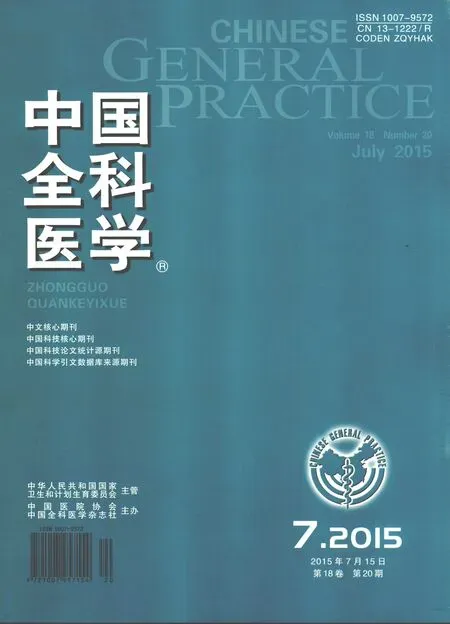质子泵抑制剂的应用风险分析
2015-01-25高明生陈拥军
高明生,陈拥军
·用药分析·
质子泵抑制剂的应用风险分析
高明生,陈拥军
质子泵抑制剂(PPI)已成为世界范围内普遍使用的药物之一,广泛用于酸相关性疾病的治疗,如消化性溃疡、胃食管反流病、Zollinger-Ellison综合征等。本研究探讨了使用PPI的潜在风险,包括骨折、肺部感染、心血管事件、营养吸收障碍、胃肠道感染、胃结直肠癌等,并分析了其作用机制。
质子泵抑制剂;骨折;肺部感染;氯吡格雷;营养不良;胃肠道;胃结直肠癌;妊娠
高明生,陈拥军.质子泵抑制剂的应用风险分析[J].中国全科医学,2015,18(20):2448-2450.[www.chinagp.net]
Gao MS,Chen YJ.Risk analysis of the application of proton pump inhibitors[J].Chinese General Practice,2015,18(20):2448-2450.
质子泵抑制剂(PPI)是目前治疗消化性溃疡使用最广泛的一类药物,通过快速抑制胃酸分泌和清除幽门螺杆菌达到快速治愈溃疡的效果,具有价格适中、疗效确切等优势。临床经验认为,PPI耐受性较好,头痛、恶心等不良反应发生率低,是一种安全、有效的药物。但随着PPI的广泛使用,其潜在风险也日益受到关注,现就PPI在临床应用的潜在风险进行综述。
1 PPI与骨折
盐酸在钙吸收过程中的作用一直存在争议。PPI抑制胃内盐酸的分泌,间接影响小肠对钙的吸收[1]。有研究发现,胃酸分泌减少的非恶性贫血患者,不溶性钙和可溶性钙的吸收速率较胃酸分泌正常者明显下降[2]。破骨细胞活性直接受PPI的影响,PPI使破骨细胞骨吸收功能降低[3]。直至目前,尚无足够的长期研究评估PPI对钙吸收的影响。短期研究发现使用PPI可降低钙的吸收,但该结论可能受到混杂因素如终末期肾病、接受血液透析等的影响[4-5]。
Yang等[6]进行的一项关于PPI治疗与髋骨骨折关系的巢式病例对照研究发现,接受PPI治疗超过1年的患者髋骨骨折发生率为4.0/1 000人年,而未接受PPI治疗的患者髋骨骨折发生率为1.8/1 000人年,在校正潜在混杂因素之后,接受PPI治疗与髋骨骨折的相关性仍然显著〔OR=1.44,95%CI(1.30,1.59)〕。该研究同时发现PPI治疗剂量和持续时间与髋骨骨折风险存在剂量-效应关系,且女性患者尤其显著。Targownik等[7]进行的一项关于长期PPI治疗与骨质疏松性骨折关系的回顾性队列研究发现,接受PPI治疗1~6年的人群中,PPI治疗和骨质疏松性骨折之间并无统计学相关性,但在接受PPI治疗超过7年的人群中,提示骨质疏松性骨折的风险升高。
2 PPI与肺部感染
目前,PPI导致肺部感染的机制尚不明确,可能与以下方面有关:(1)PPI抑制胃酸分泌使胃内pH值升高,原本不利于细菌寄居的强酸性环境被破坏,细菌在胃内定植和过度繁殖,进而通过反流或误吸导致肺部感染;(2)H+-K+-ATP酶不仅存在于胃壁细胞,也存在于呼吸道的腺体细胞,PPI通过改变腺体细胞分泌黏蛋白的pH值,有利于呼吸道细菌的定植和繁殖,增加肺部感染的风险;(3)PPI降低中性粒细胞及自然杀伤细胞的活性,降低机体免疫力,增加肺部感染风险[8]。
Laheij等[9]研究认为PPI治疗增加社区获得性肺炎(CAP)和医院获得性肺炎(HAP)的患病风险,但也有研究得出不同的结论。Sultan等[10]对7项临床试验共2 586例患者进行Meta分析,Estborn等[11]对31项临床试验共28 627例患者进行Meta分析,结果均显示PPI的使用并不增加CAP和HAP的患病风险。造成不同结果的原因可能为未将人群差异、易感因素、基础疾病、营养状况等混杂因素纳入其中,可比性较差。
3 PPI与氯吡格雷对CYP2C19的竞争性抑制
急性冠脉综合征和经皮冠状动状动脉介入治疗术后有再次发生心肌梗死的风险,需行抗血小板治疗预防,氯吡格雷是目前最常用的抗血小板治疗药物,而消化道出血是抗血小板治疗过程中最亟待解决的问题。2008年美国心脏病协会/美国心脏病学会和美国胃肠病学会专家共识推荐抗血小板治疗的同时加用PPI,以预防消化道出血[12]。
氯吡格雷为无活性的前体药物,需经细胞色素P450(CYP450)介导转化为有活性的代谢产物后才能发挥抗血小板作用。在CYP450同工酶中,CYP2C19是主导氯吡格雷生物转化的关键代谢酶。PPI也经CYP450代谢,但主要代谢酶为CYP2C19和CYP3A4。不同种类PPI对CYP2C19的竞争性抑制作用不尽相同,经体外实验发现兰索拉唑作用最大,奥美拉唑和埃索美拉唑次之,雷贝拉唑介于奥美拉唑和埃索美拉唑之间,泮托拉唑最小[13]。
从药动学角度分析,氯吡格雷和PPI均通过CYP2C19代谢,二者合用时可能会因共同竞争CYP2C19的同一结合位点而发生竞争,其结果取决于药物与CYP2C19亲和力的相对大小,高亲和力药物将与CYP2C19结合并抑制低亲和力药物的生物转化。多项研究结果显示,冠心病患者同时服用氯吡格雷和PPI会增加再次心肌梗死和再入院的风险[14-15]。但也有研究表明,同时服用氯吡格雷和PPI并不会提高心血管不良事件的发生风险[16]。氯吡格雷和PPI联合应用的效果尚需前瞻性、多中心的临床研究证实。
4 PPI与营养吸收障碍
4.1 低镁血症 2011年,美国食品药品管理局(FDA)发布药物安全通告,接受PPI治疗超过1年的患者可能引起低镁血症,单纯进行补镁无法有效改善血清镁水平,必须停止使用PPI[17]。对需长期使用PPI治疗且有心律失常病史或需使用抗心律失常药物(如地高辛)、利尿剂的低镁血症患者,需监测血清镁水平。低镁血症和低钙血症临床表现相似,严重不良事件包括手足抽搐、癫痫发作、心房纤颤、室上性心动过速和QT间期异常等。目前PPI引起低镁血症的机制尚不明确,推测可能与PPI导致胃肠道镁丢失有关。
4.2 维生素B12缺乏 Howden等[18]研究发现长期使用PPI的患者由于上段小肠对胃酸的吸收减少导致菌群过度增殖而使其数量较正常人群明显增加,PPI抑制胃酸分泌使胃内pH值升高。肠道菌群过度增殖对维生素B12的消耗增加,同时胃内pH值升高影响维生素B12从食物蛋白中析出及维生素B12与内因子的结合,最终使维生素B12在末端回肠吸收减少。另外幽门螺杆菌感染、胃切除术、胃迷走神经切断术、大量酗酒也增加了使用PPI患者维生素B12缺乏的风险[19]。
4.3 铁元素缺乏 一般认为,长期服用PPI使胃酸分泌不足甚至缺乏,导致铁元素吸收障碍,有迷走神经切断术、胃切除术、萎缩性胃炎病史患者易出现缺铁性贫血可为佐证。然而接受PPI治疗长达10年的Zollinger-Ellison综合征患者并未出现铁元素的缺乏。目前尚无对长期接受PPI治疗患者出现缺铁性贫血进行监测的权威推荐意见。
5 PPI与胃肠道感染
胃肠道与外界直接相通,每天与大量病原微生物接触,胃肠道黏膜及其拥有的正常菌群可通过复杂机制防止局部和全身感染的发生。长期使用PPI可破坏胃肠道黏膜保护机制[20],分析原因可能有:(1)PPI抑制胃酸分泌,胃内pH值升高,失去了胃酸的非特异性保护功能,导致胃肠道菌群过度生长繁殖;(2)在低胃酸情况下,食物不能被胃酸和胃蛋白酶彻底消化降解,肠道中未被吸收的营养物质,尤其是蛋白质类增加将促进某些细菌的生长,从而改变肠道正常菌群结构;(3)PPI具有延长胃排空时间和降低胃黏液黏度等作用,削弱了胃肠道的自我保护能力,增加了胃肠道感染风险。
5.1 艰难梭菌感染性腹泻(CDAD) PPI导致的肠道菌群失调是感染性腹泻的高危因素,尤其以院内CDAD多见。一项纳入了126 999例患者的系统评价证实CDAD与PPI治疗有关〔OR=2.05,95%CI(1.47,2.85)〕[21]。对于上消化道出血的患者,使用PPI可明显获益,应综合评估利弊。应强调的是,在预防CDAD的措施中,勤洗手、避免滥用抗生素等较停用PPI更为有效。
5.2 自发性腹膜炎(SBP) 目前对于PPI与SBP关系的研究主要集中在肝硬化腹腔积液患者,其肠壁水肿导致通透性增高,肠蠕动减慢,肠道屏障作用减弱,细菌从肠道移位至腹腔并繁殖,从而导致SBP。PPI可削弱胃肠道屏障功能,在SBP的发生过程中起协同的作用。Bajaj等[22]经多元回归分析显示PPI是SBP的独立危险因素〔OR=4.3,95%CI(1.3,11.7)〕。Trikudanathan等[23]Meta分析结果也认为PPI有增加SBP的风险〔OR=2.8,95%CI(1.8,4.2)〕。然而,对于停用PPI能否降低SBP的发生率和改善患者的预后尚需进一步探索研究。
6 PPI与胃结直肠癌
胃酸对胃泌素的分泌有负反馈作用,PPI使胃酸分泌减少,促进G细胞分泌胃泌素。研究发现,长期使用PPI患者胃泌素水平较未使用PPI患者高2~6倍,而高水平胃泌素是胃癌和结直肠癌的危险因素[24]。胃泌素控制胃肠道干细胞的分化,同时对胃肠道上皮细胞和赘生物具有促生营养作用,增加胃肠赘生物癌变概率。另外,PPI抑制胃酸分泌,胃肠道菌群过度增殖,产生多种致癌因子(如亚硝胺类),也可增加患胃肠恶性肿瘤的风险[25]。有研究认为,长期使用PPI与萎缩性胃炎发病率的升高有关,而萎缩性胃炎是胃癌的癌前疾病[26]。
7 PPI与妊娠
PPI对妊娠患者的安全性一直受到关注,但多项研究尚未发现PPI对妊娠患者产生不良影响。Gill等[27]对妊娠前3个月内接受PPI治疗的1 530例妊娠妇女进行Meta分析显示,未发现PPI可增加胎儿致畸风险。Pasternak等[28]对妊娠期间接受PPI治疗的超过5 000例妊娠妇女进行的队列研究显示,未发现PPI可增加胎儿出生缺陷的风险。
目前,随着PPI的广泛应用,其产生的风险事件有所增加。对两者关系的诸多观察性或回顾性研究因存在较大偏倚,结论不尽一致。虽然尚缺少高质量的前瞻性随机对照研究,但仍不能忽视PPI过度使用带来的潜在风险。PPI对一些上消化道疾病的治疗如消化性溃疡、胃食管反流病、上消化道出血等具有革命性的意义。正确合理诊断患者疾病,周期性评估患者症状,对潜在风险进行密切监测,选择最小有效剂量,实现成本-效益最大化,严格遵循PPI使用指南,均有利于降低PPI相关不良事件的发生。
[1]Bo-Linn GW,Davis GR,Buddrus DJ,et al.An evaluation of the importance of gastric acid secretion in the absorption of dietary calcium [J].J Clin Invest,1984,73(5):640-647.
[2]Sheikh MS,Santa Ana CA,Nicar MJ,et al.Gastrointestinal absorption of calcium from milk and calcium salts[J].N Engl J Med,1987,317(9):532-536.
[3]Farina C,Gagliardi S.Selective inhibition of osteoclast vacuolar H+-K+-ATPase [J].Curr Pharm Des,2002,8(23):2033-2048.
[4]Graziani G,Badalamenti S,Como G,et al.Calcium and phosphate plasma levels in dialysis patients after dietary Ca-P overload.Role of gastric acid secretion[J].Nephron,2002,91(3):474-479.
[5]Hardy P,Sechet A,Hottelart C,et al.Inhibition of gastric secretion by omeprazole and efficiency of calcium carbonate on the control of hyperphosphatemia in patients on chronic hemodialysis[J].Artif Organs,1998,22(7):569-573.
[6]Yang YX,Lewis JD,Epstein S,et al.Long-term proton pump inhibitor therapy and risk of hip fracture[J].JAMA,2006,296(24):2947-2953.
[7]Targownik LE,Lix LM,Metge CJ,et al.Use of proton pump inhibitors and risk of osteoporosis-related fractures[J].CMAJ,2008,179(4):319-326.
[8]Ho SW,Tsai MC,Teng YH,et al.Population-based cohort study on the risk of pneumonia in patients with non-traumatic intracranial haemorrhage who use proton pump inhibitors[J].BMJ Open,2014,4(11):e006710.
[9]Laheij RJ,Sturkenboom MC,Hassing RJ,et al.Risk of community-acquired pneumonia and use of gastric acid-suppressive drugs[J].JAMA,2004,292(16):1955-1960.
[10]Sultan N,Nazareno J,Gregor J.Association between proton pump inhibitors and respiratory infections:a systematic review and metaanalysis of clinical trials[J].Can J Gastroenterol,2008,22(9):761-766.
[11]Estborn L,Joelson S.Occurrence of community-acquired respiratory tract infection in patients receiving esomeprazole:retrospective analysis of adverse events in 31 clinical trials[J].Drug Saf,2008,31(7):627-636.
[12]Bhatt DL,Scheiman J,Abraham NS,et al.ACCF/ACG/AHA 2008 expert consensus document on reducing the gastrointestinal risks of antiplatelet therapy and NSAID use:a report of the American College of Cardiology Foundation Task Force on Clinical Expert Consensus Documents [J].J Am Coll Cardiol,2008,52(18):1502-1517.
[13]Li XQ,Andersson TB,Ahlström M,et al.Comparison of inhibitory effects of the proton pump-inhibiting drugs omeprazole,esomeprazole,lansoprazole,pantoprazole,and rabeprazole on human cytochrome P450 activities[J].Drug Metab Dispos,2004,32(8):821-827.
[14]Ho PM,Maddox TM,Wang L,et al.Risk of adverse outcomes associated with concomitant use of clopidogrel and proton pump inhibitors following acute coronary syndrome[J].JAMA,2009,301(9):937-944.
[15]Juurlink DN,Gomes T,Ko DT,et al.A population-based study of the drug interaction between proton pump inhibitors and clopidogrel[J].CMAJ,2009,180(7):713-718.
[16]O′Donoghue ML,Braunwald E,Antman EM,et al.Pharmacodynamic effect and clinical efficacy of clopidogrel and prasugrel with or without a proton-pump inhibitor:an analysis of two randomised trials[J].Lancet,2009,374(9694):989-997.
[17]U.S.Food and Drug Administration.FDA Drug Safety Communication:Low magnesium levels can be Associated with long-term use of Proton Pump Inhibitor drugs(PPIs)[EB/OL].http://www.fda.gov/Drugs/DrugSafety/ucm245011.htm.
[18]Howden CW.Vitamin B12levels during prolonged treatment with proton pump inhibitors[J].J Clin Gastroenterol,2000,30(1):29-33.
[19]Kaptan K,Beyan C,Ural AU,et al.Helicobacter pylori-is it a novel causative agent in Vitamin B12deficiency?[J].Arch Intern Med,2000,160(9):1349-1353.
[20]Parkman HP,Urbain JL,Knisht LC,et al.Effect of gastric acid suppressants on humangastric motility[J].Gut,1998,42(2):243-250.
[21]Leonard J,Marshall JK,Moayyedi P.Systematic review of the risk of enteric infection in patients taking acid suppression[J].Am J Gastroenterol,2007,102(9):2047-2056.
[22]Bajaj JS,Zadvornova Y,Heuman DM,et al.Association of proton pump inhibitor therapy with spontaneous bacterial peritonitis in cirrhotic patients with ascites[J].Am J Gastroenteml,2009,104(5):1130-1134.
[23]Trikudanathan G,Israel J,Cappa J,et al.Association between proton pump inhibitors andspontaneous bacterial peritonitis in cirrhotic patients-a systematic review and meta analysis[J].Int J Clin Pract,2011,65(6):674-678.
[24]Kuipers EJ.Proton pump inhibitors and gastric neoplasia[J].Gut,2006,55(9):1217-1221.
[25]Laine L,Ahnen D,McClain C,et al.Review article:potential gastrointestinal effects of long-term acid suppression with proton pump inhibitors[J].Aliment Pharmacol Ther,2000,14(6):651-668.
[26]Ye W,Nyrén O.Risk of cancers of the oesophagus and stomach by histology or subsite in patients hospitalised for pernicious anaemia[J].Gut,2003,52(7):938-941.
[27]Gill SK,O′Brien L,Einarson TR,et al.The safety of proton pump inhibitors(PPIs)in pregnancy:a meta-analysis[J].Am J Gastroenterol,2009,104(6):1541-1545.
[28]Pasternak B,Hviid A.Use of protonpump inhibitors in early pregnancy and the risk of birth defects[J].N Engl J Med,2010,363(22):2114-2123.
(本文编辑:吴立波)
Risk Analysis of the Application of Proton Pump Inhibitors>
GAOMing-sheng,CHENYong-jun.
DepartmentofGastroenterology,SuiningCentralHospital,Suining629000,China
Proton Pump Inhibitors(PPI) have become one of the most commonly used medications worldwide.They are widely used in the treatment for acid-related gastrointestinal disorders,such as peptic ulcer,gastroesophageal reflux disease(GERD),Zollinger-Ellison syndrome,etc.However,concerns have been raised about PPI therapy,including the risk of bone fractures,pneumonia,cardiovascular events,absorb nutrition disorders,enteric infections and gastric and colorectal cancer.The mechanism of action was also analyzed.
Proton pump inhibitors;Bone fractures;Pulmonary infection;Clopidogrel;Malnutrition;Gastrointestinal tract;Gastric and colorectal cancer;Pregnancy
629000四川省遂宁市中心医院消化内科
陈拥军,629000四川省遂宁市中心医院消化内科;
E-mail:yongjunchen@sina.com
R 977.3
A
10.3969/j.issn.1007-9572.2015.20.021
2014-12-12;
2015-03-20)
